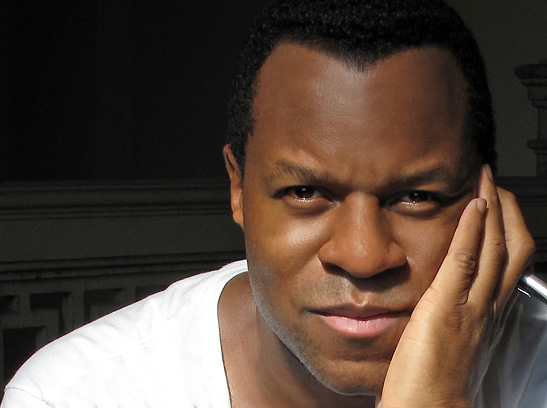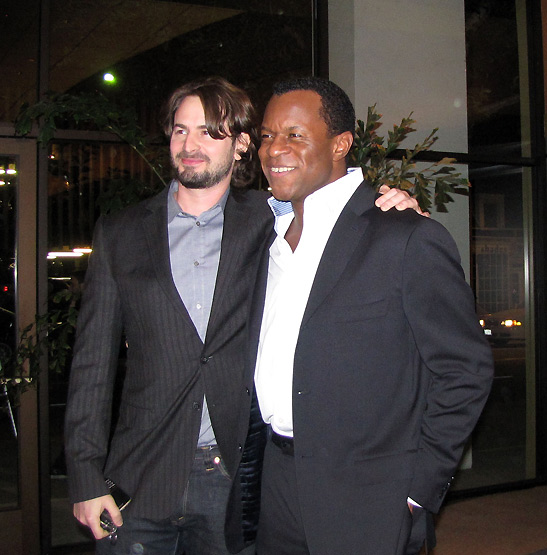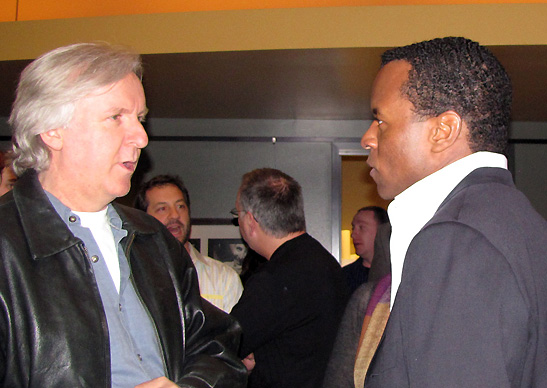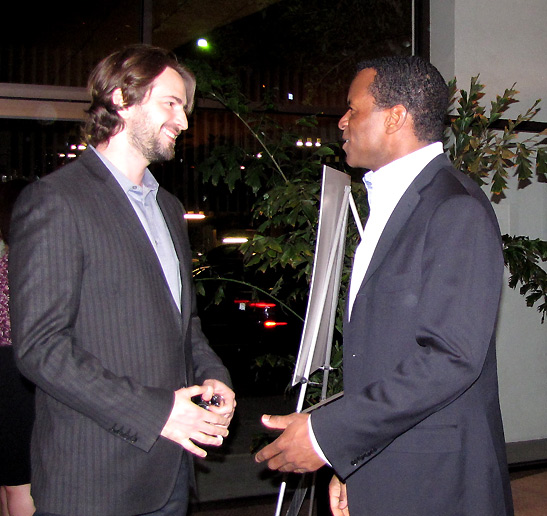 |
 |
|
 |

|
(This article originally appeared
in the Santa Monica Mirror.) I sat down with Geoffrey Fletcher in an
exclusive interview just days before his historic Oscar win for his
screenplay Precious. His wildest dream has come true and we all
rejoice in his success. His emotional acceptance speech touched something
in all of us and a resounding, collective cheer punctuated his special
moment.
Geoffrey Fletcher
TB: Congratulations on writing a brilliant script. It’s truly a work of art. Fletcher: Thank you so much. That’s very kind of you. TB: Some people are reluctant to see the film because of their perception that Precious is a downer. What are you thoughts on that? Fletcher: I think that’s an accurate observation. Because of the way films are today, more escapist fare than films that ask difficult questions or raise controversial issues, if filmgoers hear just a hint of a tough subject matter, they may stay away. However, what I’ve been hearing is when people see the film they leave feeling uplifted and then tell their friends about a remarkable experience.
TB: You’ve been struggling a long time, supporting yourself with bread-and-butter jobs. How did you push through and not give up your dream? Fletcher: I knew since I was 14, when I first got my hands on a camera, that this is what I wanted to do. It’s what I had endless passion for. So I would take various day jobs, and in the evenings, I would write at home. One day it dawned on me how much simpler my life would have been if I had chosen a more practical profession, but every fiber in my body rejected that idea so I decided to keep pushing through. TB: When you felt discouraged, who bolstered your spirits? Fletcher: After years of writing and shooting short films, I thought that maybe it was not going to happen. I turned to my brother Todd, who is a composer and screenwriter as well, and told him I was discouraged. In a soft-spoken voice, he said, ‘Sometimes it’s the darkest before the dawn.’ Shortly thereafter I asked Lee Daniels to watch my 23-minute film called Magic Markers. Lee had the rights to Precious and after seeing my film, he brought the book to my attention. I ran out and bought the last copy and fell in love with it from the opening quote and with Precious on page one or two. TB: He took a big gamble on an unknown writer. Fletcher: If Lee believes in you, he is willing to take a chance on you. It was an opportunity of a lifetime and I am both grateful and embarrassed that I hadn’t heard of Push. The story is told from the point of view of a semi-literate young woman and has some really tough stuff in it. Making that subject matter into a movie was not an easy task, but I was in love with the material and could identify with the resilience this girl needed to get through every day. TB: What is the opening quote? Fletcher: It’s from the Talmud and it goes like this: “Every blade of grass has its Angel that bends over it and whispers, Grow, grow.” That quote really embodies the entire spirit of the story.
TB: You come from an upper middle class family and are extremely well educated. How did you get inside Precious’ head to write the dialogue because I assume you never knew someone like that character? Fletcher: Why do you say that? (smiling) TB: Based on how and where you were raised, one could make an assumption that you didn’t have contact with the socio-economic segment of society depicted in the film. Did I make an improper assumption? Fletcher: No. No. I probably would have made the same assumption. As a matter of fact, Lee commented to me on more than one occasion how surprised he was that I could write in a voice that was not my own. But it is one of my voices. Precious is a very specific character in a very specific place and the beauty of it is that what she wants and how she feels and who she is, is very similar to the rest of us and very universal. TB: Did you actually know anyone like Precious? Fletcher: Absolutely. The small town adjacent to mine growing up in Connecticut was a third African-American, a third Caucasian, and a third Hispanic, and that’s where my mother taught. I think African-American people in this country, whether they are on assistance or whether they are billionaires, have a remarkable amount of shared experiences, particularly from certain generations. TB: Did you write more than one draft of the script? Fletcher: The first draft was pretty polished because I did a lot of the homework before I actually started writing. TB: Did Sapphire have script approval? Fletcher: Not to my knowledge. I met her when I was just about finished with the script and in an unusual way. I was in the West Village about to take the subway when my phone rang. I took the call after which I ran down the subway and got into a car. It was full except for two seats, one of which I took. I looked at this person very carefully and said ‘Are you a writer?’ She said ‘Yes.’ Then I said, ‘Are you Sapphire?’ She said, ‘Yes’ and introduced herself. I recognized her face only because I had been looking at the back cover of her book for months. TB: What did you talk about? Fletcher: We never discussed the script. I told her that I had an extraordinary amount of respect for what she did and how challenging and inspiring it is. TB: Did your MFA in film directing help in writing the script? Fletcher: It helped enormously as I looked at it with a very visual eye and that filter was on throughout the entire read. My goal was to honor the spirit and impact of the book, while making it accessible and an exciting visual cinematic experience. TB: In your wildest dreams did you think this film would garner as many awards as it has to date? Fletcher: No I didn’t. I had been trying for so long and to have a story that I cared about into which I could pour all of my experience, passion, and knowledge. When I looked at this book and saw the cinematic potential, the experience was like a resurrection. Beyond that I knew nothing. I didn’t know if it would get made and if it did get made, I didn’t know how widely it would be seen. I was just hoping that a few people might see it and like it and that those who had gone through what this African-American woman living in Harlem went through, would know they’re not alone. TB: Generally, people back away from someone who looks like Precious and don’t ascribe much value to that person. Do you feel that as a result of this film, you’ve raised the consciousness of people, especially white folks? Fletcher: Sometimes people who are larger, ironically are invisible. One of the things I was excited about was the idea that people would be spending a better part of two hours with her at a Cineplex. I hope this film not only makes people see others who are different, but to understand they have the same shared hopes, dreams, and joys. TB: Precious is a tribute to the human spirit. No matter how many times she was knocked down, she bounced back. Fletcher: I think people like Precious are the strongest among us. If you’re going to take any kind of inventory of someone, I think you have to look at how far that person has come, not necessarily where they are.
TB: There is an obtuse parallel between her invisibility and aging women who disappear from the landscape once they hit 50. Fletcher: That’s such an astute observation because that speaks directly to the universality of this character. Her invisibility is specifically the type that an aging woman feels. One of the great powers of storytelling is that some of the details might be different, but the human experience is universal. TB: When you were writing the script, did you go through emotional highs and lows? Fletcher: Oh yes. There were a couple of points in the story when I had to stop writing for the moment. There’s an irony about writing in that you spend so much time with a character that you love and yet you put that character through so much. TB: What is the most difficult scene for you to watch? Fletcher: The scene with Mo’Nique and Gabourey where Mo’Nique tries to explain her behavior to the social worker played by Mariah Carey. TB: Did you have a happy childhood? Fletcher: Oh yes, very happy. My mother was an educator and my dad built submarines. He spent a lot of time with us and both of my parents read to us. We were exposed to a broad range of subjects, from baseball, to math, to photography, to fishing, to music lessons. Exposure to all these things had a profound effect on the lives and careers of my brothers and me. We were told that we could do anything in this world, but they also said, ‘Whatever you decide to do, do it as well as you possibly can.’ TB: What about your siblings? Fletcher: My oldest brother Alphonse taught me the basics of animation. He saw me trying to make a movie using my action figures and showed me how to move the figures and capture it on camera. My brother Todd was a scholar in storytelling. We had casual conversations about mythology and structure and a day has not gone by where I don’t use something that came out of those conversations. TB: Do you live on the West Coast? Fletcher: No. I live in New York City and that’s where everything came together on this project. I love the old New York. The pre-war buildings and cobble stone streets. That said, every time I come to California, I find I’m enjoying it more and more and do associate it with the work. TB: Precious is up for six Academy Awards, has already won many awards and is up for a host of other awards. Do you have any fears about this being a tough act to follow? Fletcher: Oh no. Had I been a 25 year old and all this was happening, it would have affected me, but I don’t really think about it. What I do think about is the work. My number one desire is to continue working on projects that I care deeply about. TB: Do you have anything in development? Fletcher: Yes, a few things that I should know about next week. One is another writing assignment for a well-known director and the other is an original script that I will be directing and that’s my dream. TB: Well, get your tuxedo ready and best of luck on Oscar night and all your future projects. Fletcher: Thank you. It’s been a pleasure. |
|
Thanks so much for those lovely tourism photos, especially of Ireland. I certainly enjoyed all the places you suggested, and am working towards my next vacation. Don’t forget Cuba. That’s an exciting place. Rosalie, Los Angeles
Enjoyed your article on Mira Sorvino. Such an interesting background – family, education, career and now human rights activist. I'm not a gossip mag fan so getting more meaty news about movie celebrities from you gives me hope that there are some inteligent life forms in Hollywood. Peter Paul, Pasadena, CA
Thank you, Bev. This reminded me to go see the movie, "An Education," which I had already almost forgotten about, having seen the preview a few weeks ago. I enjoy this actress quite a bit--she has a uniqueness about her and she pulls me in. I enjoyed this. Sandeee, Seattle, WA
Thank you Beverly,I really enjoyed reading about your intimate conversation with Forest, of whom I am a great admirer. I look forward to seeing the film "Our Family Wedding." Yoka, Westlake Village, CA
Thank you for the sending me the beautiful article you wrote about Ireland. We will use your recomendations for hotels in the Southern part. We plan to also go to Dublin and some other Northern cities so I will get some recommendations for these from others. After reading your article, I am getting more excited about going. I think we will be in Ireland for 8 days altogether. Leah Mendelsohn, Santa Monica, CA
Very much enjoyed Ms. Cohn's article about Munich, especially the visuals. Though it has been 25 years since my last visit, the piece brought back countless pleasant memories of the city and the people!! Many thanks. Lawrence, Los Angeles * * * Marianplatz and that general area is truly one of the best Christmas celebrations in the world. Between that and Oktoberfest (which I can only imagine) Munich is one of the greatest cities in the world for major annual events. Christopher Dale, New York, NY
Hi Bev, you have done some wonderful pieces on some great celebs...Great work. The travel articles are just wonderful too. Scott Mueller, Huntington Beach, CA
Your great Zurich article makes me want to go there for the holidays! I love the photos, too, especially the ones of you in the sleigh, the view over the houses and the zoo! Anna Marie, Santa Monica, CA * * * Lovely article! As a European, and having been to Zurich (albeit in summer) I can vouch for this lovely city. Great pictures, too! Helene Robins, Santa Monica, CA
Hi Bev, Nice review, nice seeing you, nice website interface "...Talk to Bev" - Enjoy your Thanksgiving! Richard D. Kaye, Marina del Rey, CA
Hi Bev, Your interview with John Cusack is very interesting. I always wondered why these actors/actresses always get top billing when really, if you think about it, the real work come from the animators, writers and tech whizzes who spend far more hours on the movie than those actors. I know, I know, it's the all about marketing. The names of these actors are what bring in the big bucks. Still, I think these actors are way overpaid for the "little" that they do. I remember that once upon a time, the early animation classics never mentioned the voices behind the characters. I think it was only later when Walt Disney tapped into the voices of known celebrities like Walter Matthau in the Jungle Book or Zsa Zsa Gabor in The Rescuers that the voices became a marketing magnet. Keep up the good work. I enjoy your interviews as you peer into the lives of the Hollywood celebrities. Peter Paul of South Pasadena, CA
|
This site is designed and maintained by WYNK Marketing. Send all technical issues to: support@wynkmarketing.com

|

































